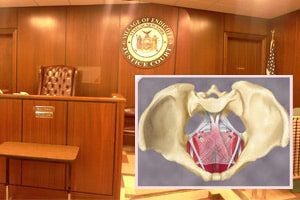
A federal jury in a bellwether injury lawsuit re-trial agreed to a $2 million judgment against transvaginal mesh device maker, C.R. Bard. The Avaulta pelvic mesh device manufactured and marketed by C.F. Bard was found to be defective and Bard was found to have neglected to warn about the mesh’s defects, according to MassDevice.com. Thousands […]
 A federal jury in a bellwether injury lawsuit re-trial agreed to a $2 million judgment against transvaginal mesh device maker, C.R. Bard.
A federal jury in a bellwether injury lawsuit re-trial agreed to a $2 million judgment against transvaginal mesh device maker, C.R. Bard.
The Avaulta pelvic mesh device manufactured and marketed by C.F. Bard was found to be defective and Bard was found to have neglected to warn about the mesh’s defects, according to MassDevice.com.
Thousands of women were recipients of transvaginal mesh devices and, now, the devices have come under intense scrutiny, as many women who were implanted with these devices are reporting complications allegedly related to their defects.
Transvaginal mesh devices were approved to treat stress urinary incontinence (SUI) and pelvic organ prolapse (POP), conditions most commonly caused by weakened pelvic muscles. Vaginal mesh devices are supposed to help correct these conditions by providing additional strength to the pelvic walls. The vaginal mesh devices were approved through a U.S. Food and Drug Administration (FDA) fast-track process known as the 510(k). Under the 510(k), a formal review for safety and efficacy is neither required nor performed. Because the 510(k) route has been used to gain clearance for transvaginal mesh and other controversial devices, the process has drawn increasing criticism.
This is the first federal lawsuit to allege that the device caused harm to a patient. An array of companies—Boston Scientific, Endo Health Solutions, Cook Medical, and Johnson & Johnson’s Ethicon subsidiary—face about 4,000 federal lawsuits over their transvaginal mesh devices, according to MassDevice.com.
The case had previously gone to trial earlier this summer, but was halted when Judge Joseph Goodwin of the U.S. District Court for Western Virginia declared a mistrial. A witness was ruled to have broken the ban on discussing Bard’s 2012 Avaulta mesh recall, MassDevice.com explained. The jury in the retrial that began on July 29 awarded the plaintiff $250,000 in compensatory damages and $1.75 million in punitive damages, according to Bloomberg News. The jury deliberated for 12 hours over two days.
This June, Endo Health subsidiary American Medical Systems (AMS) agreed to pay $54 million to settle personal injury lawsuits that had been filed over its transvaginal mesh products, according to MassDevice.com.
The first transvaginal mesh lawsuit to go to trial, just prior to this case, led to an $11.1 million verdict in favor of the plaintiff, Bloomberg News reported. That lawsuit was the first of 4,000 Gynecare Prolift cases expected to go to trial. Johnson & Johnson, maker of the Gynecare Prolift, was ordered to pay $3.35 million in compensatory damages and $7.76 million in punitive damages.
The FDA has stated that complications linked to transvaginal mesh implants are “not rare” and warned that use of such devices may actually be more harmful when compared to alternative methods for treating POP. The FDA also recently reported that the most common complications associated with transvaginal mesh may include:


